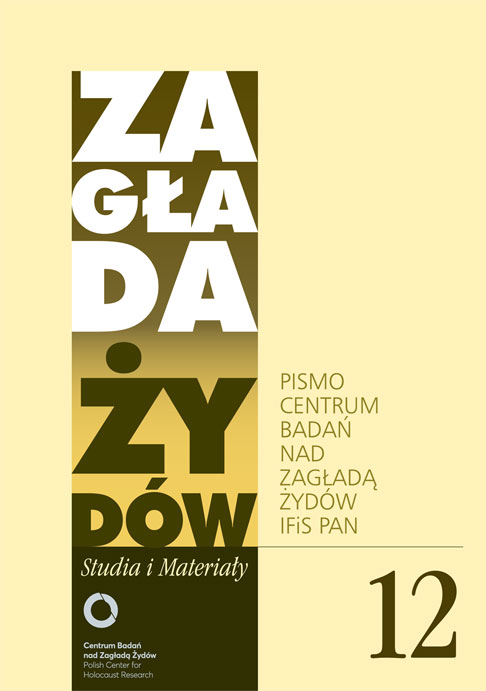Społeczeństwo holenderskie i los Żydów: skomplikowana historia
Dutch Society and the Jewish Fate: A Puzzling Record
Author(s): Dan MichmanSubject(s): Social history, Social differentiation, Studies in violence and power, Fascism, Nazism and WW II, History of the Holocaust, History of Antisemitism
Published by: Stowarzyszenie Centrum Badań nad Zagładą Żydów & IFiS PAN
Keywords: Dutch society and the Jews; Dutch Holocaust historiography;
Summary/Abstract: The percentage of victimization of Dutch Jewry during the Shoah is the highest of Western, Central and Southern Europe (except, perhaps of Greece), and close to the Polish one: 75%, more than 104.000 souls. The question of disproportion between the apparent favorable status of the Jews in society – they had acquired emancipation in 1796 - and the disastrous outcome of the Nazi occupation as compared to other countries in general and Western European in particular has haunted Dutch historiography of the Shoah. Who should be blamed for that outcome: the perpetrators, i.e. the Germans, the bystanders, i.e. the Dutch or the victims, i.e. the Dutch Jews? The article first surveys the answers given to this question since the beginnings of Dutch Holocaust historiography in the immediate post-war period until the debates of today and the factors that influenced the shaping of some basic perceptions on “Dutch society and the Jews”. It then proceeds to detailing several facts from the Holocaust period that are essential for an evaluation of gentile attitudes. The article concludes with the observation that – in spite of ongoing debates – the overall picture which has accumulated after decades of research will not essentially being altered. Although the Holocaust was initiated, planned and carried out from Berlin, and although a considerable number of Dutchmen helped and hid Jews and the majority definitely despised the Germans, considerable parts of Dutch society contributed to the disastrous outcome of the Jewish lot in the Netherlands – through a high amount of servility towards the German authorities, through indifference when Jewish fellow-citizens were persecuted, through economically benefiting from the persecution and from the disappearance of Jewish neighbors, and through actual collaboration (stemming from a variety of reasons). Consequently, the picture of the Holocaust in the Netherlands is multi-dimensional, but altogether puzzling and not favorable.
Journal: Zagłada Żydów. Studia i Materiały
- Issue Year: 2016
- Issue No: 12
- Page Range: 425-434
- Page Count: 10
- Language: Polish

